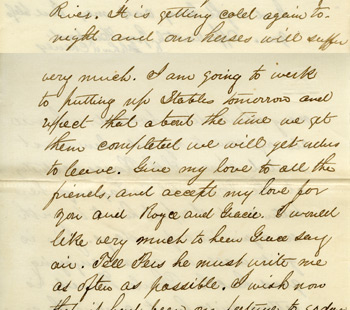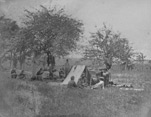Click Center Image for Full Size Picture
Life in camp behind the front lines was a dull routine, with activity following the rhythms of Army Regulations. Awaken to reveille, roll call by the 1st sergeant, then breakfast followed by drills and inspections. Fatigue details to clean the camp, gather firewood, fetch water, dig latrines, build or repair roads, and serve on picket duty were part of each day. The schedule was the same in camp on the front lines, until units were alerted to move or expect an attack.
On the march, soldiers used their issued "shelter half" for protection from the elements, partnering with a fellow soldier to form a tent or adapting the piece of cloth for as much comfort as possible. In camp, A-frame tents or walled tents were sometimes provided, but often soldiers were left to their own devices to create winter quarters from whatever materials they could find.
Artillery and cavalry men were responsible for the care and comfort of their horses and mules, as described in Cheney's letter of January 18, 1863. Many such animals lost their lives—some from battle, but more from hard use, hunger, exposure, and disease. Building a horse shelter took many men many days of effort. Cheney reported that his men had raised the frame of a stable by January 24, but, as expected, the battery was ordered to move on January 30.
January 18, 1863, Davis Mill, Mississippi.
Infantry men carried all of their belongings on their backs. In general, artillery men accumulated more personal effects because of their access to horses and wagons to carry the baggage. Officers like Cheney could have even more comforts such as camp furniture and servants to assist them.
Soldiers could only receive care packages when in a camp. These boxes stuffed with food, clothing, and other needed items were sent from home by express mail. Established camps meant access to sutlers, aid societies, and other civilian services such as laundresses.
To lessen the boredom, soldiers found recreation in writing letters, reading, playing card games and checkers, making mementoes for their friends, singing, or talking. Civil War soldiers helped to spread a new game called baseball; rule booklets were widely distributed in the camps.
Officers tried to limit vices in camp. Army Regulations prohibited the purchase of alcohol by enlisted men, but soldiers found ways to partake anyway.




